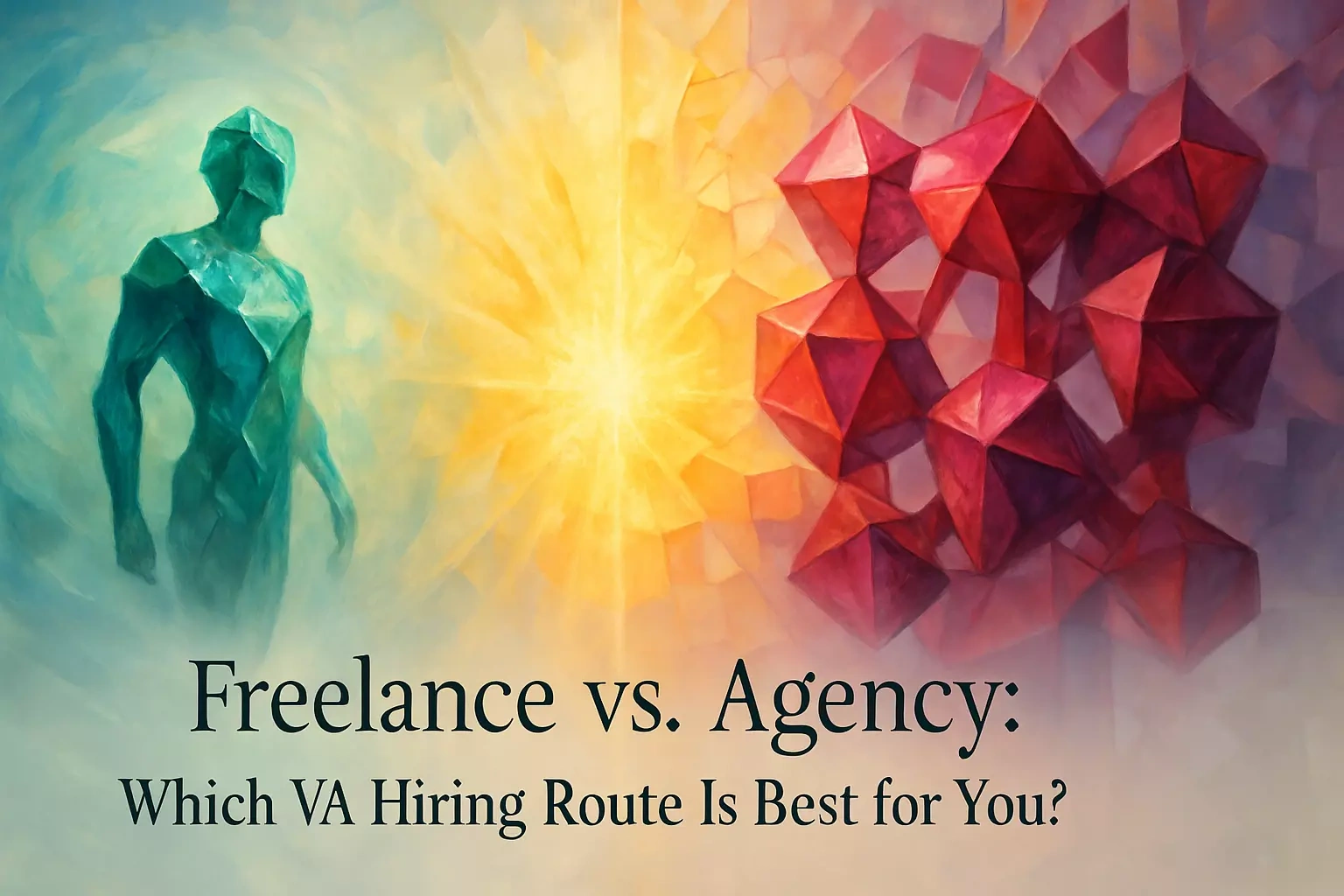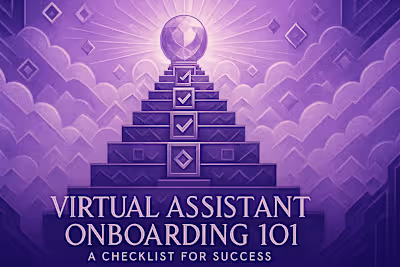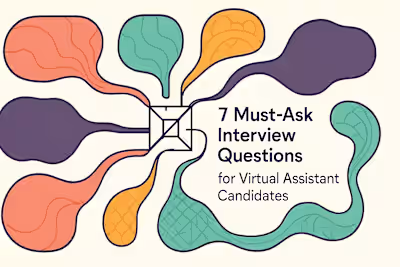Freelance vs. Agency: Which VA Hiring Route Is Best for You?

Freelance vs. Agency: Which VA Hiring Route Is Best for You?
Hiring a Freelance Virtual Assistant: The Pros and Cons
The Pros: Cost, Flexibility, and Direct Contact
The Cons: Vetting, Reliability, and Lack of Backup
Using a Virtual Assistant Agency: The Pros and Cons
The Pros: Quality, Reliability, and Scalability
The Cons: Higher Cost and Less Personal Connection
How to Choose: Key Factors for Your Business
Assess Your Budget
Consider Your Workload and Need for Scalability
Evaluate Your Management Style
Making Your Final Decision
References
Freelance vs. Agency: Which VA Hiring Route Is Best for You?
When you decide to hire a virtual assistant, you face a key choice: work directly with a freelancer or go through a VA agency? Both paths offer distinct advantages and disadvantages. Understanding these differences is crucial to making the right decision for your business needs, budget, and management style. This choice comes after you've identified potential red flags in candidates and is influenced by whether you need US-based or overseas talent.
Let's break down what each option really means for your business. A freelance VA works independently, setting their own rates and managing their own schedule. An agency, on the other hand, acts as a middleman between you and the VA. They handle recruitment, training, and often provide backup support when your primary assistant isn't available.
The decision isn't always straightforward. What works perfectly for a solopreneur might be a disaster for a growing startup. Your specific situation, work style, and business goals all play into finding the right fit.
Hiring a Freelance Virtual Assistant: The Pros and Cons
Working directly with an independent VA offers flexibility and direct communication. Approximately 65% of VAs work as freelancers, making this the most common arrangement in the industry. This popularity isn't accidental – freelance VAs offer unique advantages that many businesses find irresistible.
Think of hiring a freelance VA like hiring a contractor to renovate your kitchen. You get to work directly with the person doing the job, negotiate terms that work for both of you, and build a relationship based on mutual trust. But just like with contractors, the quality can vary wildly, and you're responsible for making sure everything runs smoothly.
The freelance model works especially well for businesses that value personal connections and want maximum control over their working relationships. It's also ideal when you have specific, well-defined tasks that don't require extensive training or oversight.
The Pros: Cost, Flexibility, and Direct Contact
Freelancers often have lower rates because they don't have agency overhead. Without the extra layer of management fees, marketing costs, and administrative expenses, freelance VAs can offer competitive pricing while still earning a good income. You might pay $15-30 per hour for a skilled freelance VA, compared to $25-50 through an agency.
Direct communication is another huge advantage. When you work with a freelancer, you're talking straight to the person doing the work. No telephone game, no misunderstandings passed through multiple people. You explain what you need, they ask clarifying questions, and you both know exactly where things stand.
The flexibility factor can't be overstated. Need extra help during your busy season? A freelancer can often ramp up their hours quickly. Project finished early? You can scale back without dealing with contracts or minimum hour requirements. This adaptability makes freelancers perfect for businesses with fluctuating needs.
Building a long-term relationship with a freelance VA often leads to them becoming an integral part of your team. They learn your preferences, understand your business inside out, and can often anticipate your needs before you even voice them. This level of familiarity and trust is priceless.
The Cons: Vetting, Reliability, and Lack of Backup
The biggest drawback is the time it takes to find and vet a qualified candidate yourself. You'll need to post job listings, review applications, conduct interviews, and check references. This process can easily eat up 10-20 hours of your time – time you probably don't have to spare.
If your freelance VA gets sick or goes on vacation, you're left without support. Unlike agencies that provide backup assistants, you're on your own when your freelancer is unavailable. This can be particularly challenging if you rely heavily on your VA for time-sensitive tasks.
There's also more variance in skill levels among freelancers. While many are highly professional and skilled, others might be just starting out or treating VA work as a side gig. Without an agency's vetting process, you might go through several candidates before finding the right fit.
Quality control falls entirely on your shoulders. You need to set expectations, provide feedback, and manage performance. Some business owners love this control, while others find it overwhelming on top of their existing responsibilities.
Using a Virtual Assistant Agency: The Pros and Cons
VA agencies act as intermediaries, providing businesses with pre-vetted virtual assistants. This model is built for reliability and quality assurance. Think of it as the difference between hiring a nanny through a service versus finding one on your own – you're paying for peace of mind and professional management.
Agencies typically maintain a roster of VAs with various skills and specialties. They handle the messy parts of employment – taxes, contracts, performance management – leaving you free to focus on your business. For many busy entrepreneurs, this hands-off approach is worth the extra cost.
The agency model has grown significantly in recent years, with companies recognizing the value of having a reliable partner in their VA journey. It's particularly popular among businesses that need multiple VAs or those in industries requiring specialized skills.
The Pros: Quality, Reliability, and Scalability
Agencies handle the recruitment and vetting process, saving you significant time. They've already interviewed candidates, checked references, and often provided training. When you contact an agency, you can have a qualified VA working for you within days, not weeks.
The backup support agencies provide is a game-changer for many businesses. Your regular VA calls in sick? The agency sends a replacement who's already briefed on your needs. Going on vacation? Your VA's colleague seamlessly takes over. This continuity ensures your business never skips a beat.
Scalability becomes much easier with an agency. Need to add three more VAs for a big project? One phone call and it's done. Want to try a VA with different skills? The agency can match you with someone from their roster. This flexibility is ideal for growing businesses or those with seasonal demands.
Quality assurance is built into the agency model. Most agencies monitor performance, provide ongoing training, and have systems in place to ensure consistent service. If you're not happy with your VA, they'll find you a replacement quickly.
The Cons: Higher Cost and Less Personal Connection
Agency services are typically more expensive due to management fees and overhead. You're not just paying for the VA's time – you're paying for the agency's recruiting, training, management, and profit margin. This can add 30-50% to the base cost of VA services.
Communication might be less direct when working through an agency. Some agencies require all communication to go through account managers, which can slow things down and create opportunities for miscommunication. Even when you can communicate directly with your VA, there might be agency policies that limit flexibility.
You may have less choice in who you work with. While agencies try to match you with suitable VAs, you might not click with their selection. Switching VAs within an agency is usually possible, but you're limited to their roster.
The relationship can feel more transactional and less personal. Your VA might be working with multiple clients through the agency, making it harder to build the kind of deep, collaborative relationship possible with a dedicated freelancer.
How to Choose: Key Factors for Your Business
The right choice depends entirely on your specific business needs. There's no one-size-fits-all answer, but there are clear indicators that can guide your decision. Let's walk through the key factors that should influence your choice.
Consider where you are in your business journey. A startup founder juggling multiple roles might benefit from an agency's hands-off approach. An established business owner with clear processes might prefer the cost savings and direct relationship of working with a freelancer.
Think about your risk tolerance too. Can your business handle the occasional disruption if a freelance VA is unavailable? Or do you need the reliability and backup that agencies provide? Your answer will point you in the right direction.
Assess Your Budget
If cost is your primary concern, a freelance VA is often the more affordable option. You'll save 30-50% compared to agency rates, which can add up to thousands of dollars annually. For a small business or solopreneur, these savings can make the difference between affording help or continuing to struggle alone.
However, consider the hidden costs of working with freelancers. Your time spent recruiting, training, and managing has value. If you bill $100 per hour and spend 20 hours finding and onboarding a VA, that's $2,000 in opportunity cost. Suddenly, the agency premium doesn't look so steep.
Budget considerations go beyond hourly rates. Freelancers often require payment processing fees if they're international, while agencies typically handle this. Agencies might include tools and software in their packages, while freelancers might expect you to provide access.
Think long-term about your budget too. A slightly more expensive agency VA who stays with you for years might be more cost-effective than cycling through multiple freelancers.
Consider Your Workload and Need for Scalability
If you have a fluctuating workload or anticipate needing more support in the future, an agency offers easier scalability. They can quickly provide additional VAs during busy periods and scale back during slow times. This flexibility is invaluable for businesses with seasonal patterns or project-based work.
For short-term or highly specialized projects, a freelancer might be a better fit. You can find someone with exactly the skills you need, work intensively for a few weeks or months, then part ways cleanly. This project-based approach is harder to achieve with agencies that often prefer longer-term relationships.
Consider your growth trajectory. If you're planning to expand rapidly, having an agency relationship in place means you can scale your VA support alongside your business growth. They'll understand your needs and can provide increasingly sophisticated support as you grow.
Workload predictability matters too. If you have consistent, ongoing tasks, either model can work. But if your needs vary wildly week to week, the flexibility to quickly adjust hours makes freelancers attractive, while the ability to tap into different skill sets makes agencies appealing.
Evaluate Your Management Style
If you prefer a hands-on approach and direct communication, a freelance relationship is ideal. You'll have complete control over training, feedback, and daily interactions. This works well if you enjoy mentoring and building close working relationships.
Some business owners thrive on this direct management. They like knowing exactly what their VA is working on, providing immediate feedback, and building systems together. If this sounds like you, a freelancer will likely be more satisfying.
If you want a more hands-off solution where management and quality control are handled for you, an agency is the better choice. You can focus on high-level direction while the agency handles day-to-day management, performance reviews, and problem-solving.
Consider your availability too. If you travel frequently or have packed schedules, managing a freelancer directly might be challenging. An agency's management layer ensures your VA stays productive even when you're unavailable.
Making Your Final Decision
After weighing all these factors, you might find that one option clearly stands out. But what if you're still on the fence? Here's a practical approach: start with whichever option feels slightly more comfortable and give it a genuine try for 3-6 months.
Many successful businesses actually use both models. They might have a core freelance VA who handles ongoing tasks and knows the business inside out, plus agency VAs for specialized projects or overflow work. This hybrid approach combines the best of both worlds.
Remember that your choice isn't permanent. You can start with an agency to get immediate help, then transition to a freelancer once you better understand your needs. Or begin with a freelancer and move to an agency if you need more structure and support.
The most important thing is to take action. Whether you choose a freelancer or an agency, having VA support will free up your time for high-value activities. Don't let analysis paralysis keep you from getting the help you need.
Your business is unique, and your VA solution should reflect that. Trust your instincts, start somewhere, and adjust as you learn what works best for you. The perfect VA relationship – whether through a freelancer or agency – is out there waiting for you.
References
Like this project
Posted Jun 30, 2025
Hiring a virtual assistant? Compare the pros and cons of hiring a freelance VA versus using a VA agency to decide which is the right choice for your business.








